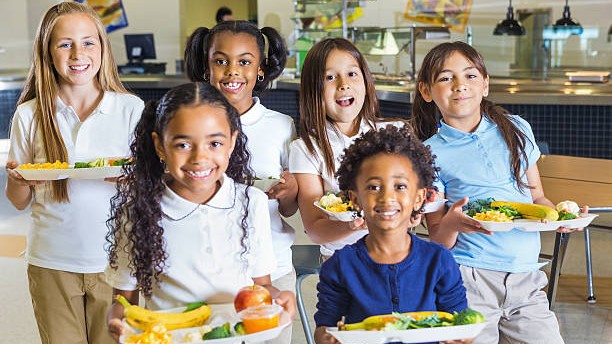
The Kentucky Department of Agriculture works year-round to encourage more Kentucky schools to source food for breakfast and lunch meals from local farmers.
KDA working to get local foods into more Kentucky schools
By Chris Aldridge
Kentucky Ag News
FRANKFORT — Kentucky Agriculture Commissioner Jonathan Shell envisions a future when school lunchrooms sourcing their food from local farmers will be common practice.
“He wants to take farm to school from being a program to something that schools do … when food service directors are making a procurement decision,” said Ian Hester, director of the Kentucky Department of Agriculture’s (KDA) Division of Food Distribution. “It should be Kentucky farms first.”
KDA Farm to School Program coordinator Tina Garland said when schools buy local, it benefits local farmers and the community, as well. “For every dollar spent locally, it circulates seven times before it leaves that community,” she noted.
Hester gave an example of a school sourcing chicken from a local farm.
“Say they have a local chicken farmer that can provide 400 chicken legs a week,” he said. “They might need 2,000 a week, but they buy those 400, and then they use their other prime vendor to provide whatever they can't get from a local farmer.
“As that relationship grows, maybe that local farmer scales production up to where eventually they're meeting that need. Or maybe it's multiple farmers in that area that start meeting that need once they find out that there's a real good steady source (of income).”
Garland encourages Kentucky farmers interested in selling local food products to schools to sign up by going to https://www.kyagr.com/consumer/LFPA-Grant.html, then clicking on “KDA LFPA Interest Survey” under "Forms & Documents."
“We’re really trying to build and continue the momentum that we’ve gained (since) coming off of the Local Food for Schools Grant that ended in April,” he said of the $3.2-million federal program. “What that grant allowed us to do over the last three years is work with about 140 farmers across the state and get them connected to school systems. Even though those grants ended, we want those relationships to continue.”
KDA began the Kentucky Farm to School Stars Recognition Program this year to annually reward three school districts a total of $24,000 for purchasing the most food directly from Kentucky farmers.
“We are working with distributors that schools use to try to get more Kentucky farms plugged into the distribution channels that already exist there,” Hester said of large food distributors that supply schools, such as Gordon Food Service, Sysco, U.S. Foods, and What Chefs Want. “We're encouraging schools to ask them (distributors) for their local list…. A distributor is not going to go through the work of buying local if the customer is not asking for it.”
Jackson, Ky., Independent Schools in Breathitt County was awarded the top prize, $10,000. “They’re small but mighty,” Garland said of the school district.
Second and third place went to the public school districts in Mercer and Barren counties, respectively. Mercer was awarded $8,000, and Barren received $6,000.
To get students involved in the Farm to School Month celebration, KDA debuted a new competition called Burger Battle. Schools can promote local agriculture by making a burger containing at least one item produced or raised in their county, at least one item from a neighboring county, and at least one item from the state of Kentucky.
For example, McCracken County High School in Paducah submitted its “River City Deluxe BBQ Burger.” Ingredients include Wood Brothers Hamburger and Starnes BBQ, both in Paducah; barbecue sauce from Patti’s 1880s Settlement in neighboring Livingston County; and pepper jack cheese from Country View Creamery in Trenton, Ky.
“They (burgers) are voted on,” Garland said, “then we highlight one burger each week on our website.”
For more information about Farm to School Month in Kentucky, contact Garland at Tina.Garland@ky.gov and (502) 782-9212, or go to www.kyagr.com/consumer/farm-to-school.html.

